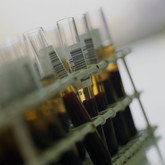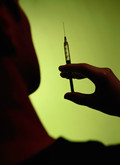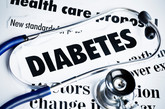Biosimilars
Biosimilarity testing using very low doses of rituximab
Rituximab is a chimeric, monoclonal antibody directed against CD20 expressed on B lymphocytes [1]. Currently approved indications for use are non-Hodgkin lymphomas, chronic lymphatic leukaemia, rheumatoid arthritis, granulomatosis with polyangiitis and microscopic angiitis [2]. However, rituximab is frequently used ‘off label’ for the treatment of numerous antibody-dependent autoimmune diseases [3].
FDA rejects botulinum toxin biosimilar from Evolus
US-based Evolus announced on 16 May 2018 that the US Food and Drug Administration (FDA) had rejected its application for approval of DWP‑450 (prabotulinumtoxinA).
FDA rejects Amgen’s trastuzumab biosimilar
Biotech giant Amgen announced on 4 June 2018 that the US Food and Drug Administration (FDA) had rejected the application for approval of its trastuzumab biosimilar.
Biosimilar insulins have same efficacy and safety as reference biologicals
Researchers from the US have found that biosimilar insulins have comparable safety and clinical efficacy as their reference biologicals [1].
Biosimilar infliximab blocked in Australia
Switzerland-based drug giant F. Hoffmann-La Roche (Roche) has gained a temporary order in an Australian Federal Court blocking Sandoz from launching its rituximab biosimilar.
Savings with use of biosimilar trastuzumab for breast cancer patients in Croatia
Breast cancer is worldwide the most common cancer in women. In 2012 alone, there were approximately 464,000 new cases and 131,000 deaths from breast cancer in Europe. In Croatia, breast cancer was the fourth leading cause of death among women and ninth in both sexes in 2016.
Biosimilars and the role of regulatory authorities
According to authors Hye-Na Kang and Ivana Knezevic, from the World Health Organization (WHO), market access to biosimilars can be restricted by several factors [1]:
(i) manufacturing processes may be expensive and complex
(ii) patents on the manufacturing processes of the original product may not have expired
(iii) biosimilar manufacturers may have limited access to data on the original product
(iv) appropriate regulatory frameworks may not be in place
(v) government policies on switching to biosimilars, pricing and reimbursement may be lacking.
Celltrion resubmits biosimilar trastuzumab to FDA
South Korean biotechnology company Celltrion announced on 18 June 2018 that it had resubmitted its application for marketing approval for its candidate trastuzumab biosimilar, CT‑P6, to the US Food and Drug Administration (FDA).
Efficacy, safety and immunogenicity of adalimumab biosimilar BI 695501
Adalimumab is the most commonly prescribed biological and is approved for rheumatoid arthritis as well as psoriasis, psoriatic arthritis, along with Crohn’s and ulcerative colitis. Its patent life terminated in 2016 in the US [1]. However, in the US AbbVie has stated that, although the composition of matter patent covering Humira expired in December 2016, non-composition of matter patents covering Humira expire no earlier than 2022. The company has therefore made settlement agreements with Amgen and Samsung Bioepis, delaying the launch of biosimilars until January 2023 [2, 3].
Spanish associations sign biosimilars collaboration
The Spanish Association of Biosimilar Medicines (BioSim) announced on 21 March 2018 that BioSim and the Federation of Spanish Medical Scientific Associations (FACME) have signed a collaboration agreement that includes the creation of a joint working group to share up-to-date information on biosimilars.













